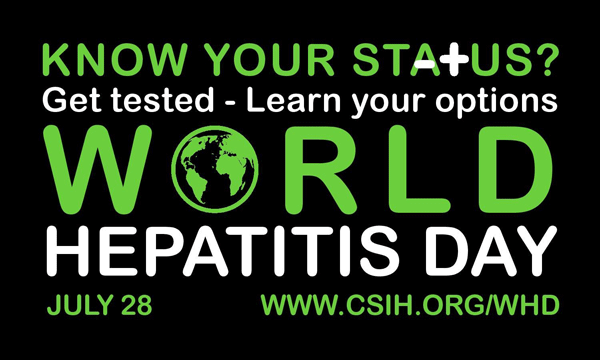Join us on Thursday, July 27 from 9:00 a.m. to 2:00 p.m. at the Covent Garden Market to learn about viral hepatitis, testing and support available in our community. We’ll have some snacks, giveaways and fun games, too! The following day is World Hepatitis Day (Friday, July 28), which marks a global effort to raise awareness on the importance of testing, prevention and treatment of hepatitis.

In Canada, about 600,000 people are living with hepatitis B or C and an estimated 44% are unaware they have the disease. Both hepatitis B and C can lead to serious liver damage, liver cancer and the need for a liver transplant, but early diagnosis and treatment can help lessen damage to the liver and prevent spreading the virus to others unknowingly.
Event
Thursday, July 27
9:00 a.m. to 2:00 p.m.
Covent Garden Market
Snacks, giveaways and fun games!
Get Tested
- Monday, July 24 from 1:00 – 4:00 p.m.
Youth Action Centre (Age 16-24) 1-4
332 Richmond St, London, ON N6A 3C3 - Thursday, July 27 from 11:00 a.m. – 4:00 p.m.
Regional HIV/AIDS Connection
#30-186 King Street, London, ON N6A 1C7 - Friday, July 28 from 9:00 a.m. – 4:00 p.m.
Regional HIV/AIDS Connection
#30-186 King Street, London, ON N6A 1C7
#ShowYourFace Campaign
#ShowYourFace on World Hepatitis Day and share the World Hepatitis Alliance’s united message on Friday, July 28 at 12:00 p.m. using the social media add-on app called Thunderclap. To share this united message, sign up at the World Hepatitis Alliance’s Thunderclap page.
Facts
- Viral hepatitis is inflammation of the liver caused by a virus. Both hepatitis B and C can lead to serious liver damage, liver cancer and the need for liver transplant.
- In Canada, about 600,000 people are living with hepatitis B or C and an estimated 44 per cent are unaware they have the disease. People born between 1945 and 1965 have the highest reported infection rate because of the use of unscreened blood products before blood control standards came into effect in 1991.
- Hepatitis B is transmitted through body fluids and blood contact, such as mother to child transmission, unprotected sex and unsterilized needles. There is a vaccine to prevent hepatitis B.
- Hepatitis C is spread through blood contact, including unsafe injection practices and unscreened blood products, or something as simple as sharing toothbrushes, razors and nail clippers. There is no vaccine, but recent pharmaceutical developments have proven effective in curing hepatitis C.
- Viral hepatitis progresses slowly, destroying liver cells and causing inflammation, but often goes undetected for 20-30 years.
- Early diagnosis and treatment can help to lessen damage to the liver and can prevent spreading the virus to others unknowingly.
Additional Information
For more information, please visit www.csih.org or whdcanada.org.